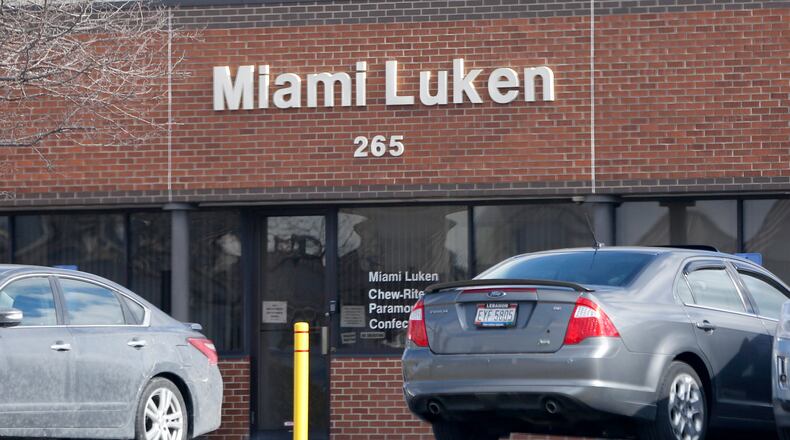Miami-Luken is facing not only the DEA investigation but also several lawsuits and a congressional inquiry over whether it filled orders for unsafe levels of opioids when instead the company should have alerted authorities about the suspicious orders.
A message was left with Miami-Luken’s attorney Richard Blake, with McDonald Hopkins.
MORE ON MIAMI-LUKEN
• Congress continues investigation into Springboro pharmacy distributor
• Why Springboro drug distributor is under fed scrutiny
• Did drug distributors contribute to opioid crisis? Yes, says local exec.
Miami-Luken and three national distributors are all under scrutiny and fielding dozens of lawsuits over whether they played a roll in the opioid overdose epidemic that has manifested as one of the worst public health crises in the United States, killing thousands and often starting with a legal prescription.
Miami-Luken’s insurance company, Navigators Insurance Co. doesn’t have to cover the costs to defend against the DEA action because of the insurance policy doesn’t cover claims similar to a prior lawsuit.
The insurance policy agreement signed in 2015 by Dr. Joseph Mastandrea, Miami-Luken’s chairman, doesn’t cover claims stemming from the same issues brought under a previous lawsuit settled with the state of West Virginia. The lawsuit initiated in 2012 was settled four years later for $2.5 million with the West Virginia attorney general’s office.
U.S. District Judge Susan Dlott ruled in favor of the insurance company, agreeing that the DEA investigation is about many of the same issues as the West Virginia case.
Miami-Luken switched to Navigators for insurance coverage after it was dropped July 2015 by its prior insurance carrier Cincinnati Insurance Co. due to its claims history.
Miami-Luken used William Knerr, a Miami-Luken board member and insurance broker, to obtain replacement coverage in the amount of $5 million, up from the $1 million limit of its prior policy, court documents state.
The documents stated Dr. Joseph Mastandrea, Miami-Luken’s CEO, checked “no” on a form asking if any company directors knew of anything that might results in a future claim under the policy. The policy stated that if knowledge of any potential claim did exist, the policy would not cover any future claims that subsequently arise from the undisclosed circumstance.
RELATED: Local people share their addiction recovery stories
In November, about a month after the policy was signed, the DEA served Miami-Luken with an order that said from as early as 2007 through 2015, Miami-Luken failed to disclosure suspicious orders of opioid painkillers to customers in the Appalachian tri-state region of southern Ohio, eastern Kentucky and southern West Virginia.
The DEA’s order asked Miami-Luken to show why the DEA should not revoke its license. The order was issued after the DEA had served 22 subpoenas on Miami-Luken, with each subpoena stating that a criminal investigation was being conducted and demanded information related to the company’s distribution practices in relation to the Controlled Substances Act.
Seven of the DEA subpoenas issued from April 29, 2013 through June 2, 2015 — before Miami-Luken applied for the Navigators Policy — demanded information on orders filled for the same small-town pharmacies that were scrutinized during the West Virginia case.
On February 5, 2016, Miami-Luken sent Navigators a letter enclosing the DEA order and requested a claims representative. On April 22, 2016, Navigators denied coverage.
The court held oral argument on February 27, 2018 and last week issued a ruling.
Miami-Luken argued that Navigators was too broad in how it was interpreting the insurance policy and by Navigators standards, any claim could be potentially be denied.
But Dlott disagreed, stating “As described above, in this case, the facts and circumstances between the exclusion and Order to Show Cause overlap extensively and are substantially similar.”
UNMATCHED COVERAGE
The Dayton Daily News continues to keep you informed on the local health care industry. For the latest updates follow reporter Kaitlin Schroeder on Twitter @kschroederDDN or Facebook at Kaitlin Schroeder DDN.
THE STORY SO FAR
PREVIOUSLY: Miami-Luken has been in the national spotlight over accusations that it supplied Appalachian pharmacies with dangerously large orders of opioids instead of alerting authorities. The DEA is trying to take away its license.
WHAT'S NEW: Miami-Luken's insurance company does not have to cover the company's costs of defending itself against the DEA, an Ohio judge ruled.
WHAT'S NEXT: The DEA is still trying to take Miami-Luken's license away. Other lawsuits are still pending, including one brought by Ohio Attorney General Mike DeWine.
About the Author
